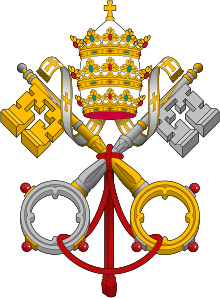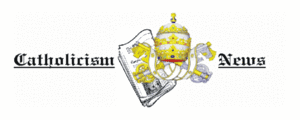Portal:Catholic Church
Introduction The Catholic Church, also known as the Roman Catholic Church, is the largest Christian church, with 1.39 billion baptized Catholics worldwide as of 2022. It is among the world's oldest and largest international institutions, and has played a prominent role in the history and development of Western civilization. The church consists of 24 sui iuris churches, including the Latin Church and 23 Eastern Catholic Churches, which comprise almost 3,500 dioceses and eparchies located around the world. The pope, who is the bishop of Rome, is the chief pastor of the church. The Diocese of Rome, known as the Holy See, is the central governing authority of the church. The administrative body of the Holy See, the Roman Curia, has its principal offices in Vatican City, a small independent city-state and enclave within the Italian capital city of Rome, of which the pope is head of state. The core beliefs of Catholicism are found in the Nicene Creed. The Catholic Church teaches that it is the one, holy, catholic and apostolic church founded by Jesus Christ in his Great Commission, that its bishops are the successors of Christ's apostles, and that the pope is the successor to Saint Peter, upon whom primacy was conferred by Jesus Christ. It maintains that it practises the original Christian faith taught by the apostles, preserving the faith infallibly through scripture and sacred tradition as authentically interpreted through the magisterium of the church. The Roman Rite and others of the Latin Church, the Eastern Catholic liturgies, and institutes such as mendicant orders, enclosed monastic orders and third orders reflect a variety of theological and spiritual emphases in the church. Of its seven sacraments, the Eucharist is the principal one, celebrated liturgically in the Mass. The church teaches that through consecration by a priest, the sacrificial bread and wine become the body and blood of Christ. The Virgin Mary is venerated as the Perpetual Virgin, Mother of God, and Queen of Heaven; she is honoured in dogmas and devotions. Catholic social teaching emphasizes voluntary support for the sick, the poor, and the afflicted through the corporal and spiritual works of mercy. The Catholic Church operates tens of thousands of Catholic schools, universities and colleges, hospitals, and orphanages around the world, and is the largest non-government provider of education and health care in the world. Among its other social services are numerous charitable and humanitarian organizations. (Full article...) Selected article
 The First Council of Nicaea, held in Nicaea in Bithynia (present-day İznik in Turkey), convoked by the Roman Emperor Constantine I in 325, was the first Ecumenical council of the Christian Church, and most significantly resulted in the first uniform Christian doctrine, called the Nicene Creed. With the creation of the creed, a precedent was established for subsequent 'general (ecumenical) councils of Bishops' (Synods) to create statements of belief and canons of doctrinal orthodoxy— the intent being to define unity of beliefs for the whole of Christendom.The purpose of the council was to resolve disagreements in the Church of Alexandria over the nature of Jesus in relationship to the Father; in particular, whether Jesus was of the same substance as God the Father or merely of similar substance. St. Alexander of Alexandria and Athanasius took the first position; the popular presbyter Arius, from whom the term Arian controversy comes, took the second.
Selected image
 Oil-on-panel portrait of Sir Thomas More by Hans Holbein the Younger (1527)
Thomas More was a lawyer and political figure in 16th century England, best remembered as Henry VIII's Lord Chancellor. Selected biography
 John Chrysostom (349– ca. 407, Greek: Ιωάννης ο Χρυσόστομος, Latin: Ioannes Chrysostomos) was the archbishop of Constantinople. He is known for his eloquence in preaching and public speaking, his denunciation of abuse of authority by both ecclesiastical and political leaders, the Liturgy of St. John Chrysostom, and his ascetic sensibilities. After his death (or, according to some sources, during his life) he was given the Greek surname chrysostomos, meaning "golden mouthed", rendered in English as Chrysostom.The Orthodox Church and Eastern Catholic Churches honor him as a saint (feast days: November 13 and January 27) and count him among the Three Holy Hierarchs (feast day, January 30), together with Saints Basil the Great and Gregory the Theologian. He is recognized by the Roman Catholic Church as a saint and a Doctor of the Church.
Did you know...

Related portalsFeast Day of May 16
Selected quote

News
SubcategoriesTopics
The Holy Bible:
Particular Churches (grouped by liturgical rite):
Things you can do
External resourcesWikiProjectsAssociated WikimediaThe following Wikimedia Foundation sister projects provide more on this subject:
Discover Wikipedia using portals |

































